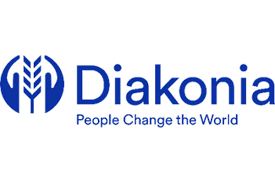Location
SE-167 14 Bromma
SWEDEN
Diakonia is an international development organization with Christian values that works together with local partner organizations for sustainable change for the most vulnerable people in the world.
Diakonia is a faith-based Swedish development organization. We support and work with around 350 local partner organizations in 25 countries. Together with our partner organizations, we form a global network that works to ensure that more people are able to live dignified lives.
Members:
Resources
Displaying 21 - 23 of 23Land Management and Urban Development
General
The project aims to create conditions for sustainable innovative development in Belarus through improved land management and urban development.
Objectives
- The project «Improving land management and urban development in the Republic of Belarus, using contemporary methods and technologies» was implemented during the activity period Sep. 2016 – Dec. 2019. - The objectives were to: --- strengthen the potential of CSO «OO “Land Reform”» in the fields of land administration, urban planning and community initiatives, as well as that of other CSOs --- contribute to spatial planning democratisation with regard to inclusion of population in the local planning process --- enhance the cadastral valuation system for purpose of real property taxation and tax control within the real property sector --- implementation an operational plan for gender analysis
Capacity Development in Land Management Rwanda 2022-2027
General
The programme Capacity Development in Land Management in Rwanda, with an activity period 2022-2027, is to a large extent a continuation of an ongoing support to the Swedish Mapping, Cadastre and Land Registration Authority (Lantmäteriet) for its collaboration and support to Rwanda National Land Authority (NLA). The programme will contribute to a transparent, reliable, and accountable land management is driving the socio-economic transformation towards a sustainable future for all Rwandans. The expected outcomes of the intervention is 1. Project Management: NLA is a leading sustainable land management organization, driving coordination between key stakeholders contributing to sustainable socio-economic and environmental development for all Rwandans. 2. Land Administration: Land Administration in Rwanda is based on principles of transparency, efficiency, gender equality, accessibility and accountability and can accommodate social, legal and technological changes to deliver customer centred services to all Rwandans. 3. Surveying, Mapping and GIS: Capable staff and sustainable systems providing accurate, standardized and accessible geo-spatial information, services and products, contributing towards the socio-economic development in Rwanda. 4. Land Use Planning: Efficient land use management in Rwanda through development, implementation, monitoring and awareness of City of Kigali and Districts Land Use Master Plans, which are in compliance with the National Land Use and Development Master Plan 2020-2050 (NLUDMP).
Objectives
The programme will contribute to that transparent, reliable, and accountable land management is driving the socio-economic transformation towards a sustainable future for all Rwandans. The expected outcomes of the programme are: Programme Management: NLA is a leading sustainable land management organization, driving coordination between key stakeholders contributing to sustainable management of land for socio-economic development for all Rwandans. Land Administration: Land Administration in Rwanda is based on principles of transparency, efficiency, gender equality, equity, accessibility, and accountability and can accommodate social, legal and technological changes to deliver customer centered services to all Rwandans. Surveying, Mapping and GIS: Capable staff and sustainable systems providing accurate, standardized, and accessible geo-spatial information, services, and products, contributing towards the socio-economic development in Rwanda Land Use Planning: Efficient land use management in Rwanda through development, implementation, monitoring and awareness of City of Kigali and Districts Land Use Master Plans, which are in compliance with the National Land Use and Development Master Plan 2020-2050 (NLUDMP)
Local Democratic Governance Phase 3, 2014-2017
General
The intervention aims to improve inclusiveness and accountability of land governance and prevent conflict linked to land management in Mali. Expected results are: 1) Improved performance of local land management arrangements; 2) Improved ownership of local government authorities in land and natural resources management; 3) Improved performance of citizen control for accountability between stakeholders involved in land and natural resource management; 4) lmproved sustainable use of agricultural land and other natural resources (forests, grazing, water).



